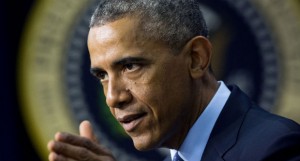Obama and the midterm elections: What’s at stake?
WASHINGTON— For President Barack Obama, the stark reality of the looming midterm elections is that the best outcome for his party gets him nothing but two more years of the status quo.
Two more years of a divided Congress. Two more years battling a Republican-led House that sees little overlap with the president’s priorities. And two more years that are likely to pass without the kind of legacy-building legislation that has eluded the president throughout his second term.
And yet to White House aides, it sure beats the alternative — a Republican takeover of the Senate.
“Who sets the agenda in the Senate matters in a big way,” said Dan Pfeiffer, Obama’s senior adviser. If Republicans take the Senate, Pfeiffer predicted a “doubling down on the (Texas Republican Sen.) Ted Cruz, shutdown, hostage-taking” approach to government.”
The reality is that Obama’s advisers have low expectations for passing major legislation even if Democrats hang onto the Senate. That’s been a struggle for Obama ever since the Republicans won the House four years ago and will likely get even harder as both parties turn their attention toward the 2016 presidential election and lawmakers get even more reluctant to take on tough issues.
Article continues after this advertisementWith three weeks until Election Day, Republicans have a takeover of Congress within their sights. The party is likely to extend its majority in the House and needs to pick up just six seats to grab control of the Senate for the first time in nearly a decade.
Article continues after this advertisementObama enters the campaign’s homestretch with approval ratings hovering near the lowest point of his presidency, forcing Democratic candidates to distance themselves from their party’s leader. Losing control of the Senate could cement the impression of a politicallyimpotent, lame-duck president more than two years before the end of his term.
In a flurry of fundraisers this fall, Obama has cast the elections as crucial to his efforts to raise the minimum wage, institute equal pay legislation and boost infrastructure spending. “I hope that in these midterms you feel a sense of urgency,” he told donors in California last week.
Beyond the long-shot prospects for major legislation, White House aides point to the impact a Democratic-led Senate would have in helping Obama to get nominees confirmed, including his upcoming pick for attorney general and potential Supreme Court openings. A Democratic Senate majority would give the president a firewall to prevent Republican efforts to repeal or scale back some of his most significant achievements, including his massive health care overhaul and sweeping financial reform legislation. And it would allow the White House to fend off any Senate investigations of the administration.
It’s hardly the kind of ambitious and inspiring agenda Obama forecast in his two presidential bids. With that in mind, some Democratic strategists have speculated that both the president and the party might actually be better served if Republicans were to take control of the Senate.
Few Democrats will make that case publicly in the closing weeks of a high-stakes campaign. But privately, some strategists suggest that Republicans may feel pressure to show they can be productive in power, allowing Obama to forge alliances with a Republican Senate on issues like tax reform and perhaps even a compromise on an immigration overhaul.
Indeed, past presidents have had some luck in forging agreements with the opposing party, including Bill Clinton, who overcame staunch opposition from Republicans to work with the party to pass a balanced budget and welfare reform. But unlike Obama, Clinton maintained approval ratings above 50 percent for much of his presidency and oversaw a booming economy, both factors that helped him leverage support from the Republicans.
